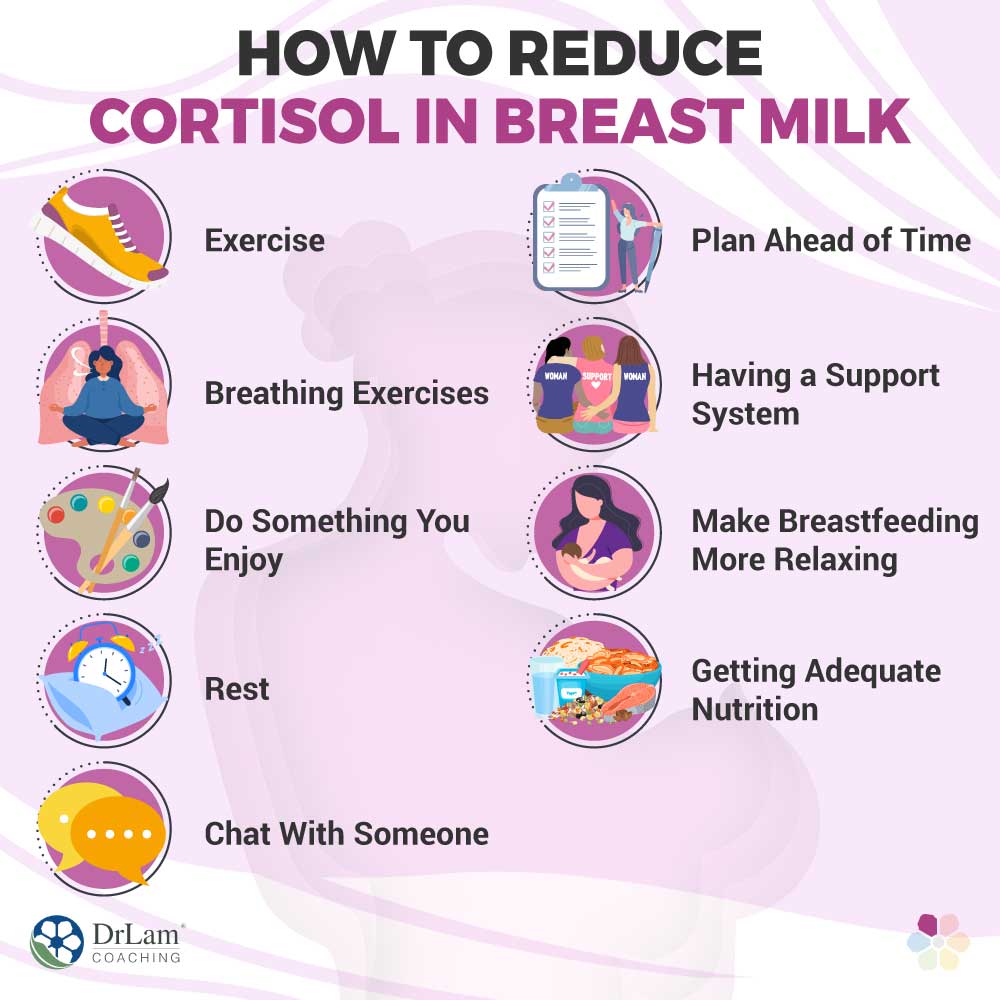 Breastfeeding is a major part of the postpartum period for many women. Not only can breastfeeding help in increasing the bond between mother and baby, but breast milk is also the primary source of food for most infants in the first six months of life. However, along with all the nutrients from breast milk, an infant's gut also absorbs other substances that may not be beneficial. One of these substances that can be in breast milk is cortisol, the "stress hormone." This article will explore the effects of cortisol in mother's milk on infants and ways you may be able to lower these levels.
Breastfeeding is a major part of the postpartum period for many women. Not only can breastfeeding help in increasing the bond between mother and baby, but breast milk is also the primary source of food for most infants in the first six months of life. However, along with all the nutrients from breast milk, an infant's gut also absorbs other substances that may not be beneficial. One of these substances that can be in breast milk is cortisol, the "stress hormone." This article will explore the effects of cortisol in mother's milk on infants and ways you may be able to lower these levels.
Even if you have had the experience of breastfeeding, you may not be aware of the nutritional composition of breast milk and why it is beneficial for an infant.
Breast milk contains typical macronutrients like protein, fat, carbohydrates, and water. These macronutrients are important in an infant's diet.
However, what makes breast milk uniquely beneficial is its micronutrients and other beneficial substances. Breast milk contains a range of vitamins and minerals that are needed for optimal growth and functioning. It also contains substances called immunoglobulins that support and enhance the infant's immune system, along with hormones and enzymes that assist the infant in growing.
The content of breast milk can change slightly depending on the mother's diet. If the mother's diet is low in a certain vitamin or mineral and has low bodily stores of this nutrient, it may cause the breast milk to have low levels of this nutrient. Many substances can pass from the mother into the breast milk, and that is why it is important to not take drugs and certain medications while breastfeeding.
Cortisol is a hormone that your body releases in times of stress. The adrenal glands, two glands that sit on top of your kidneys release this hormone. In small doses, cortisol is beneficial. It helps assist your body in responding to stress and any harmful situations. On a short-term basis, cortisol is beneficial to your body. However, if the cortisol levels remain high, it can cause side effects.
The effects of long-term high cortisol include:
Temperament refers to an individual's behavioral style. Everyone has a temperament including infants. Characteristics of temperament include activity level, mood, and attention span. Many factors influence an infant's temperament including the content of breastmilk. Substances in breast milk that can affect an infant's temperament are:
Everyone produces cortisol, including breastfeeding mothers. The period after giving birth is an important and special time for both baby and mom, and theoretically, it involves the mom focusing solely on her health and her baby. Unfortunately in today's society, this time is reduced, with many mothers juggling work, care for other children, relationships, chores, and other duties.
 When a mother experiences stress, cortisol levels increase. This cortisol passes from the blood to the breast milk and then to the infant. When consumed, the infant's gut absorbs the cortisol, and this cortisol affects the signals that travel to the brain and affect the areas of the brain that regulate emotion. The long-term effects of cortisol in mothers' milk are still being investigated and are largely unknown. However, studies found that higher levels of cortisol in mothers' milk corresponded to infants who cried easily or became irritable in new places.
When a mother experiences stress, cortisol levels increase. This cortisol passes from the blood to the breast milk and then to the infant. When consumed, the infant's gut absorbs the cortisol, and this cortisol affects the signals that travel to the brain and affect the areas of the brain that regulate emotion. The long-term effects of cortisol in mothers' milk are still being investigated and are largely unknown. However, studies found that higher levels of cortisol in mothers' milk corresponded to infants who cried easily or became irritable in new places.
Other studies focusing on the effect of cortisol in mothers' milk found that at two and half months, high levels of cortisol were associated with a higher level of fear, and at three months, a high level of cortisol was associated with more negative emotions such as sadness and fear. Both of these findings were found to be only true in girls, not boys. Whilst there does appear to be a correlation between cortisol levels in mothers' milk, more research is necessary.
However, there does appear to be a connection. And not only can higher levels of cortisol affect an infant's temperament, but it can also result in greater weight gain and higher blood sugar levels, which can later result in obesity, heart conditions, and diabetes.
One common condition that can lead to chronically high levels of cortisol is Adrenal Fatigue Syndrome (AFS). This condition is a result of chronic stress. Your body can cope with short-term stress through the adrenal glands the NeuroEndometabolic (NEM) Stress Response System. Your adrenal glands release cortisol in response to the stress and the NEM system supports your adrenal glands.
The NEM System consists of six circuits of related organs and systems. The circuit most closely related to high cortisol is the Hormone circuit. Your adrenal and thyroid glands and reproductive organs make up this circuit. These three organs produce hormones to support your body and assist in energy production and reproductive health.
If there is an imbalance within this circuit, it can disturb the hormones that these organs produce. These hormones include cortisol and can increase in quantity in breast milk. The disturbances of these hormones can also cause an additional lack of energy, sleeplessness, and depression which can then heighten postpartum stress as well. This can result in a further increase in cortisol in mother's milk.
While there are many things you can do to reduce cortisol levels, be cautious about using supplements if you have AFS. There are multiple supplements on the market claiming to help support your body during times of stress and reduce the levels of cortisol. While these claims do sound tempting, it is important to remember that the FDA does not regulate supplements. This means that the quality and efficacy of the supplement are not guaranteed.
During AFS, your body can become very sensitive, especially to new products or foods that are introduced during this time. This can result in your body reacting negatively and can set you back in the healing journey. Supplements can also sometimes have unexpected effects on your baby if you are breastfeeding.
That's why, before starting a new supplement, it may be beneficial to chat with your healthcare provider before trying any new products. Your healthcare provider will be able to provide a supportive plan for you, and it will reduce the risk of you being set back on your healing journey.

Although cortisol in mothers' milk can affect an infant, there is a range of practices and remedies that can reduce the cortisol in mothers' milk. These include lifestyle and nutritional practices that can be done before and after birth to help reduce cortisol levels.
 Exercise includes any form of physical activity that gets your muscles moving and your heart pumping. It is an important part of maintaining a healthy lifestyle and is important during all stages of life, including pregnancy and parenting. Exercise is also a great way to reduce stress levels.
Exercise includes any form of physical activity that gets your muscles moving and your heart pumping. It is an important part of maintaining a healthy lifestyle and is important during all stages of life, including pregnancy and parenting. Exercise is also a great way to reduce stress levels.
Exercise stimulates the release of endorphins, which are feel-good hormones that act as natural antidepressants. It also helps to reduce the number of stress hormones, including cortisol, that are released. This can help naturally reduce your cortisol levels. It can also get you out of the house and back into nature and help you be in the present moment, which also helps to reduce stress and anxiety.
However, if you are pregnant or less than eight weeks postpartum, talk to your doctor about any exercise plans. Note that gentle exercises, like walking and yoga, are also best for adrenal fatigue.
Breathing may seem obvious, as it is something you do without thinking. However, it plays an important role in wellness and stress. When you are stressed or anxious, your breathing rate changes, from slow and controlled, to quick and shallow breaths. It can even include holding your breath. This can result in your body experiencing more stress and anxiety.
Breathing exercises are a great way to control your breathing during stressful times. Practicing these exercises helps to lower your heart rate and blood pressure. This helps to reduce your stress and reduces your cortisol levels.
When your baby arrives and parenthood begins, it's easy to forget your life before kids and concentrate solely on your child. However, practicing a hobby after the baby is born can help with stress. Recent studies suggest that practicing a hobby can help reduce blood pressure, and cortisol levels, and can help reduce your waist circumference.
Rest after childbirth is tough, especially when an infant is depending on you and waking up regularly throughout the night. Whilst this does make it challenging to get adequate rest, it is important to prioritize sleep. Inadequate sleep is associated with high cortisol levels and a higher risk of conditions linked to high cortisol levels such as high blood pressure.
Try to nap throughout the day, and though it may be difficult to do so, sleep when the baby is sleeping. Go to bed early, and if possible, share the nights with your partner. Practicing breathing exercises and physical activity can help increase the quality of your sleep and can help relax your body in preparation for sleeping.
There are a lot of changes when you become a mother, and it is completely natural to feel overwhelmed or isolated at times. Having someone to chat with can help you get your thoughts and emotions out and help you process the changes. It can also help provide you with another perspective on challenges, as well as help break those challenges into bite-sized challenges. This can help reduce the stress you're feeling and can empower you to tackle the changes you are currently experiencing.
If you are feeling down, anxious, or having difficulty concentrating chatting with a professional can help you get the support you need. But even a friend or another mother can provide invaluable support during this time.
Planning efficiently before and after childbirth can help you manage your stress levels and could possibly prevent them. Before birth, this type of planning can include cooking in bulk and freezing for later use or organizing a food delivery service for when you give birth. This will help to take one stress off your shoulders.
If you have multiple children or are planning to work shortly after giving birth, make sure that your support system and childcare are in place before you need them. This will help ensure that everything runs smoothly after birth.
 Support systems are important to have when raising a baby. A support group can range from one individual to a small group of individuals who have your best interests at heart and can help support you during this time. A support group also helps reduce loneliness and can provide you with guidance and help if and when you need it. Having a support group can help reduce your stress and also provide you with the assurance that you are supported.
Support systems are important to have when raising a baby. A support group can range from one individual to a small group of individuals who have your best interests at heart and can help support you during this time. A support group also helps reduce loneliness and can provide you with guidance and help if and when you need it. Having a support group can help reduce your stress and also provide you with the assurance that you are supported.
If you are struggling to breastfeed or finding the experience stressful, it can help to settle down in a quiet and peaceful space. Make sure that you are comfortable. If there are any outside noises or distractions, close the door and play peaceful music. Focus on the time together and the experience rather than the stresses of the day. And if you are pumping, it can help to do so in a place where you feel safe and can think of your baby.
If you are having challenges with breastfeeding, seek the support of a professional who specializes in breastfeeding. This can help to ensure your baby has a good latch, pumping is going well, the milk is providing enough nutrients, and any other concerns are addressed.
Getting adequate nutrition whilst breastfeeding is vital as your infant is dependent on you for adequate nutrients. Not only does your nutrition help with the growth and development of your infant but getting adequate nutrition can assist with stress.
Nutrients that can help reduce cortisol levels are:
There are also foods that research suggests increase cortisol in mother's milk. These include foods that contain:
These foods should be limited. If you are finding it difficult to get some of these nutrients, such as omega 3 fatty acids from fish, a supplement can help in providing your body with the particular nutrient.
The journey of motherhood can be very fulfilling, but it also does comes with some challenges. Taking steps to lower your stress levels is a great way to improve your relationship with your baby, take care of yourself, and lower cortisol in mother's milk. Getting adequate nutrition, prioritizing rest and sleep, talking to friends, family, or a support group, and getting some exercise are all good ways to help lower your cortisol.
If you are currently breastfeeding and are concerned with your stress levels, you can call the Dr. Lam team at +1 (626) 571-1234 for a free initial call or click here.
Cortisol in mothers' milk varies throughout the day. Cortisol levels are highest in the early morning and lower throughout the day, reaching the lowest levels at midnight. Rather than trying to feed around your cortisol levels, focus on reducing your stress levels and feed according to your infant's hunger.
